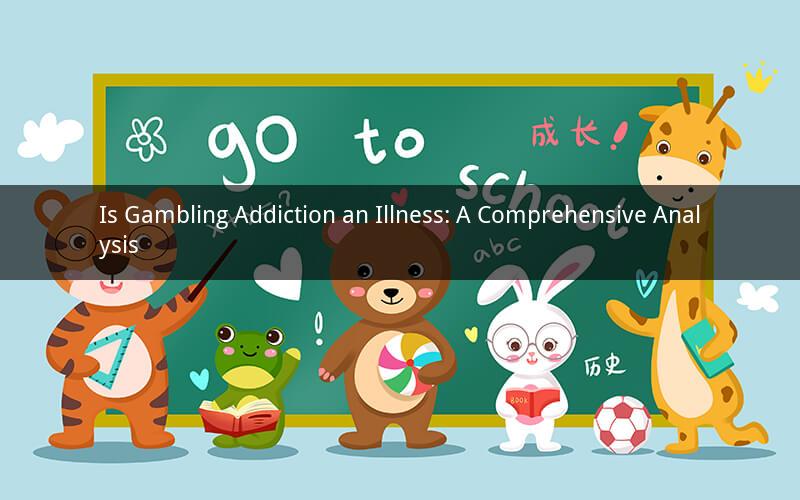
Introduction:
Gambling addiction, also known as gambling disorder, has become a significant concern in society. Many individuals struggle with this condition, and its impact on their lives can be devastating. However, the question of whether gambling addiction is an illness remains a topic of debate. In this article, we will explore the various aspects of gambling addiction, its symptoms, causes, treatment options, and its classification as an illness.
Symptoms of Gambling Addiction:
Gambling addiction, like any other addiction, exhibits certain symptoms that can be identified. These symptoms include:
1. Preoccupation with gambling: The individual constantly thinks about gambling, planning their next betting session, and often becomes irritable when unable to gamble.
2. Loss of control: Despite efforts to stop or control gambling, the individual finds it increasingly difficult to resist the urge to gamble.
3. Escalation of gambling behavior: The individual may start with small amounts of money but gradually increases the stakes to satisfy their craving for excitement.
4. Time and money spent on gambling: The individual dedicates a significant amount of time and money to gambling, often at the expense of other important aspects of life.
5. Consequences of gambling: Despite the negative consequences, such as financial problems, damaged relationships, and legal issues, the individual continues to engage in gambling.
Causes of Gambling Addiction:
Several factors contribute to the development of gambling addiction. These include:
1. Genetic predisposition: Research suggests that there may be a genetic component to gambling addiction, as individuals with a family history of addiction are more susceptible.
2. Environmental factors: Exposure to gambling opportunities, such as casinos or online platforms, can increase the likelihood of developing gambling addiction.
3. Psychological factors: Individuals with certain personality traits, such as impulsivity or a need for excitement, may be more prone to developing gambling addiction.
4. Social factors: Peer pressure, social influence, and the desire to impress others can also contribute to the development of gambling addiction.
Treatment Options:
Treating gambling addiction requires a comprehensive approach that addresses both the psychological and environmental aspects. Here are some commonly used treatment options:
1. Cognitive-behavioral therapy (CBT): CBT helps individuals identify and change the thoughts and behaviors that contribute to their gambling addiction.
2. Motivational interviewing: This technique helps individuals recognize the negative consequences of their gambling behavior and motivates them to seek change.
3. Support groups: Joining support groups such as Gamblers Anonymous can provide individuals with a sense of community and support from others who have experienced similar struggles.
4. Medication: While there are no specific medications for gambling addiction, certain medications may be prescribed to address underlying mental health conditions that contribute to the addiction.
Classification as an Illness:
The classification of gambling addiction as an illness has been a subject of debate. Here are some arguments supporting its classification:
1. The Diagnostic and Statistical Manual of Mental Disorders (DSM-5) recognizes gambling addiction as a mental disorder. This classification provides a framework for diagnosing and treating the condition.
2. The World Health Organization (WHO) also recognizes gambling addiction as a mental health disorder. This recognition highlights the seriousness of the condition and the need for appropriate treatment and support.
3. The similarities between gambling addiction and other addictive behaviors, such as substance abuse, suggest that it is a valid illness.
4. The impact of gambling addiction on individuals' lives, including their physical, mental, and social well-being, further supports its classification as an illness.
Conclusion:
In conclusion, gambling addiction is a complex condition that can have severe consequences for individuals and their families. While the debate on its classification as an illness continues, the available evidence suggests that it is indeed an illness. By recognizing gambling addiction as a mental disorder, we can take steps to provide appropriate treatment and support to those affected. It is crucial to address the underlying causes, provide comprehensive treatment options, and create a supportive environment for individuals struggling with gambling addiction.
Questions and Answers:
1. What are the primary symptoms of gambling addiction?
- The primary symptoms of gambling addiction include preoccupation with gambling, loss of control, escalation of gambling behavior, time and money spent on gambling, and consequences of gambling.
2. Can gambling addiction be treated?
- Yes, gambling addiction can be treated. Treatment options include cognitive-behavioral therapy, motivational interviewing, support groups, and medication.
3. How can individuals seek help for gambling addiction?
- Individuals can seek help for gambling addiction by consulting with mental health professionals, joining support groups, or contacting helplines and hotlines dedicated to gambling addiction.
4. Are there any genetic factors that contribute to gambling addiction?
- Yes, research suggests that there may be a genetic component to gambling addiction, as individuals with a family history of addiction are more susceptible.
5. How can society support individuals with gambling addiction?
- Society can support individuals with gambling addiction by providing accessible treatment options, raising awareness about the condition, and creating a supportive environment that encourages individuals to seek help.